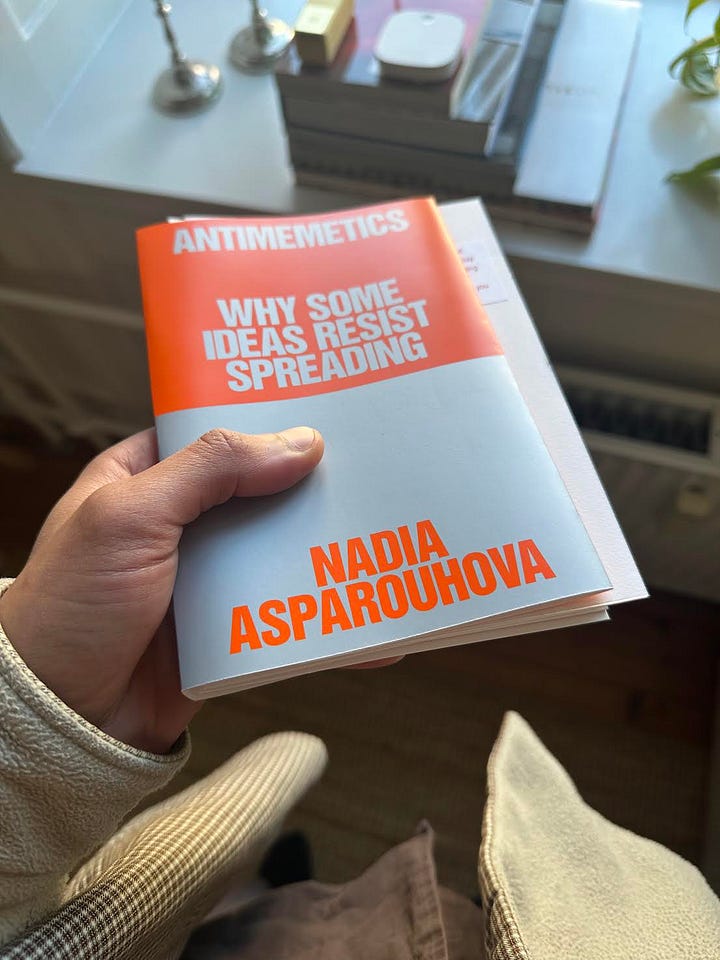When people ask me “what I’ve been thinking about lately,” I feel like I’m playing a game of Codenames:
It’s a popular party game where you lay out a grid of random words and have to come up with clues that tie many different concepts together, in hopes of nudging your team to choose the correct words and score points.
If my life were a Codenames grid right now, it would include the following:1
Antimemetics
Advanced meditation
Silicon Valley ideology
Help, codemaster! Make that into a clue, and you’ve got this newsletter update.
I don’t usually like sending link roundups, but I’ve been publishing too many things recently, on too many seemingly-disparate fronts (except to my subconscious, who is somehow weaving these themes together into a single individual called “Nadia”), to make a story out of it.
So…here’s what I’ve been up to lately. You can treat it like a board of charcuterie, and only pick out the bits you like (cornichons for me – hold the mortadella, please). Or, for that matter, like mingling with a bunch of Nadia-shaped guests at a house party, and politely excuse yourself to get a drink whenever you get bored (I won’t be offended).
Antimemetics (the book)
The New Yorker published a lovely book review of Antimemetics this week, written by Gideon Lewis-Kraus. Beyond his coverage of the book, I think it’s a great explanatory piece of the internet’s recent vibe shift, and why neither the left (with its emphasis on gatekeeping) nor the right (with its emphasis on mimetic desire) has offered a satisfying narrative that gets us to where we’re going next.
My internet politics, in a nutshell:
Asparouhova’s basic intuition is that both of the prevailing theories of information on the internet (either that it had to be sanitized and controlled or that it was simply natural for it to remain perennially downstream of charisma) have been wrong….[but] she does not think that all communication can be reduced to a power struggle, she is not ready to give up on democratic values or civilization tout court, and she considers herself one of many “refugees fleeing memetic contagion.”
Ben Davis of Artnet News also wrote a shorter review of Antimemetics, which we discussed at length on his podcast. (As an aside, I’ve enjoyed getting to talk about this book with a wide range of audiences, from our dear technology brothers at TBPN, to the art critics at Artnet, to my fellow illegible internet blogger Applied Divinity Studies.)
BOOK RELEASE! We released the digital version of Antimemetics this week, so if you bought your copy already, it’s now available (you should have received an email about it). If you haven’t bought a copy yet, you can get the Kindle version now on Metalabel or on Amazon.
The physical copies are still heading to our distributors, but they should likely ship to everyone next week. Here are a few sneak preview photos from our designer (see the shiny silver print?), aka “proof of physical copy”:


Advanced meditation
Meanwhile, I’ve been plugging away in relative peace and solitude on my latest topic of fascination: advanced meditation and the remarkable, intense states we can engender using only our minds.
I started working with the Meditation Research Program at Harvard University/Mass General, led by Matthew Sacchet, a neuroscientist who’s doing, in my view, some of the most critical research in this space today. We are currently developing an education initiative that I’m excited to share more about in the coming months.
Matthew is an absolute beast at publishing papers2, but what primarily attracted me to his work is that he, too, cares about translating scientific and contemplative knowledge into meaningful and actionable insights for the average person. As you might imagine, it’s not easy to find people like this in meditation land, where many conversations quickly unravel into Buddhist poetry and start to feel more like a hazing ritual.
I also recently published a few bits of research from my work last year with Jhourney, a meditation retreat company. We spent some time trying to identify factors that are correlated with meditation success. Beyond the more obvious, demographic-type factors (like social media or prior psychedelic use), we uncovered a few interesting behaviors. One is about how people who overestimate their abilities are less likely to access deeper states, and the other is about how challenges with feeling pleasant emotions in the body (such as alexithymia) is especially correlated with difficulties.
I’ve had some good conversations about framing meditation as a trainable skill – if so, what would the underlying pedagogy look like? It may seem obvious, but many meditators push back on the idea that their skills can be measured or assessed in any rigorous way. And yet, meditation experience (as defined by e.g. number of hours meditated) doesn’t seem to correlate to abilities, so I think there’s room for more experimentation here – which is why I’m excited about my work with Matthew’s lab.
Silicon Valley’s political ideology
Last but not least, I published a piece about Silicon Valley’s political ideology in American Affairs. The impetus was a seminar I co-hosted with Tim Hwang last fall – days before the presidential election – where we brought some people together to discuss where the “Silicon Valley ideology” is going and where it’s been.
In the American Affairs piece, I revisit Richard Barbrook and Andy Cameron’s iconic “Californian ideology” essay from 1995 to argue that Silicon Valley is not libertarian. Nor was it ever classically liberal. Nor is it currently undergoing a “rightward shift.” Tech is its own, strange, undefinable thing (apropos to this newsletter?) that chronically suffers from a lack of allies, as evinced by its getting dumped by the Democratic Party in the 2010s, and its current, growing dissatisfaction with the Republican Party in the 2020s.
It’s hard to write timeless essays about rapidly changing topics for a quarterly magazine, and there’s a lot I wish I could have expanded on in this piece, given how DOGE (and tech’s increasingly skeptical relationship to it) has unfolded, but I’m glad for the opportunity to situate our current moment in historical tech commentary. I hope it helps address some of the outdated notions that tech’s behavior can be attributed to merely being libertarian, obsessively capitalist, or autistically engineer-brained.
This Codenames grid does not include the other thoughts that are presently crowding my headspace, such as “My toddler loves to brush his teeth, but why does he only brush one side of his mouth, and how can I convince him to brush the other side without causing him to scream and throw himself on the ground in blatant protest of the mommy dictatorship?” and “How do I get the furniture store in Italy to fill out a U.S. customs declaration of the plant materials contained in the armchairs I ordered three months ago, along with the scientific names of each plant, so that FedEx stops calling me every day and doesn’t send my chairs back to Europe?”
As opposed to me, the wretched refuse of the uncredentialed, who briefly entertained the idea of submitting my research to a scientific journal earlier this year, and ended up coated, sticky, and shivering in the horrendous oil spill of its sprawling and indecipherable requirements. I ran, like an Exxon penguin victim in need of a sweater, to the nearest iceberg to clean off my feathers, vowing never to venture within 100 yards of journal publishing again.




Hmmm...Interesting...#Curi0z What QUESTI0Nz would Nadia ask if she had just 3...? Who would she ask...?